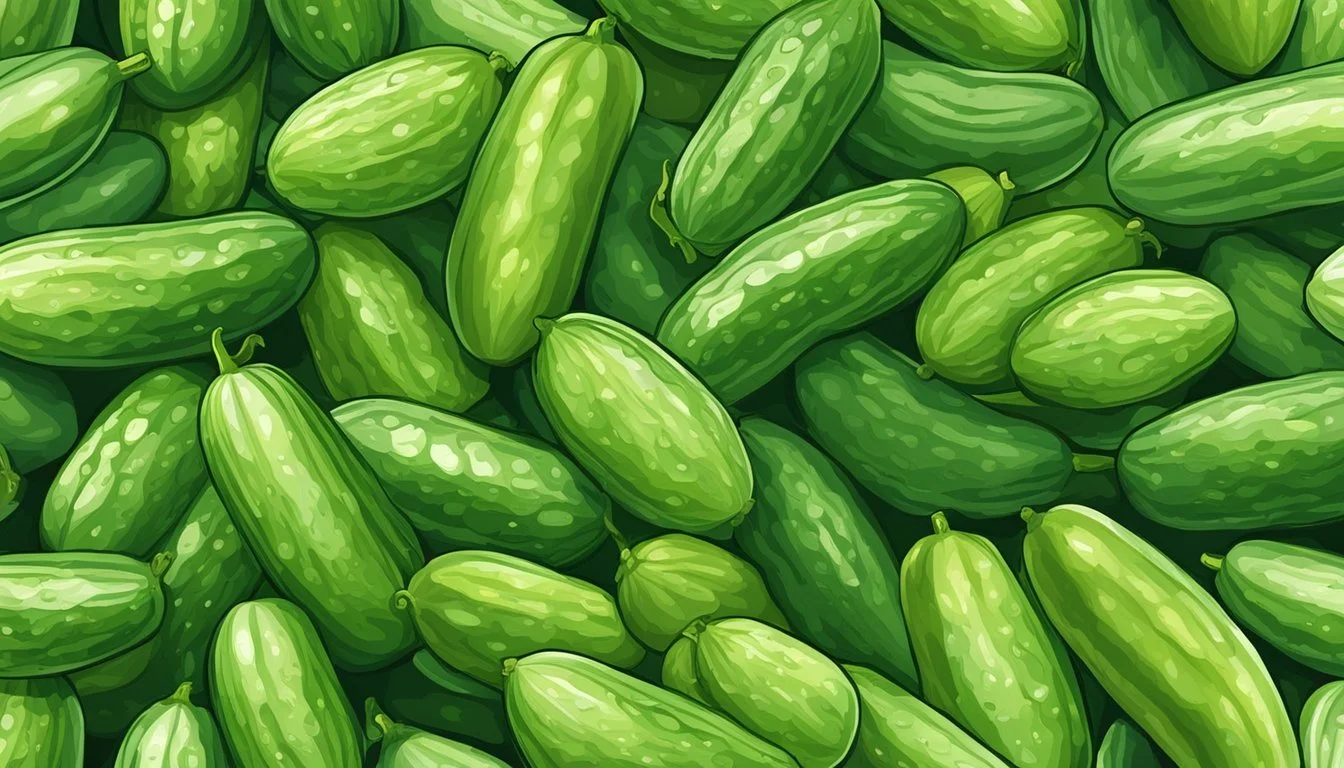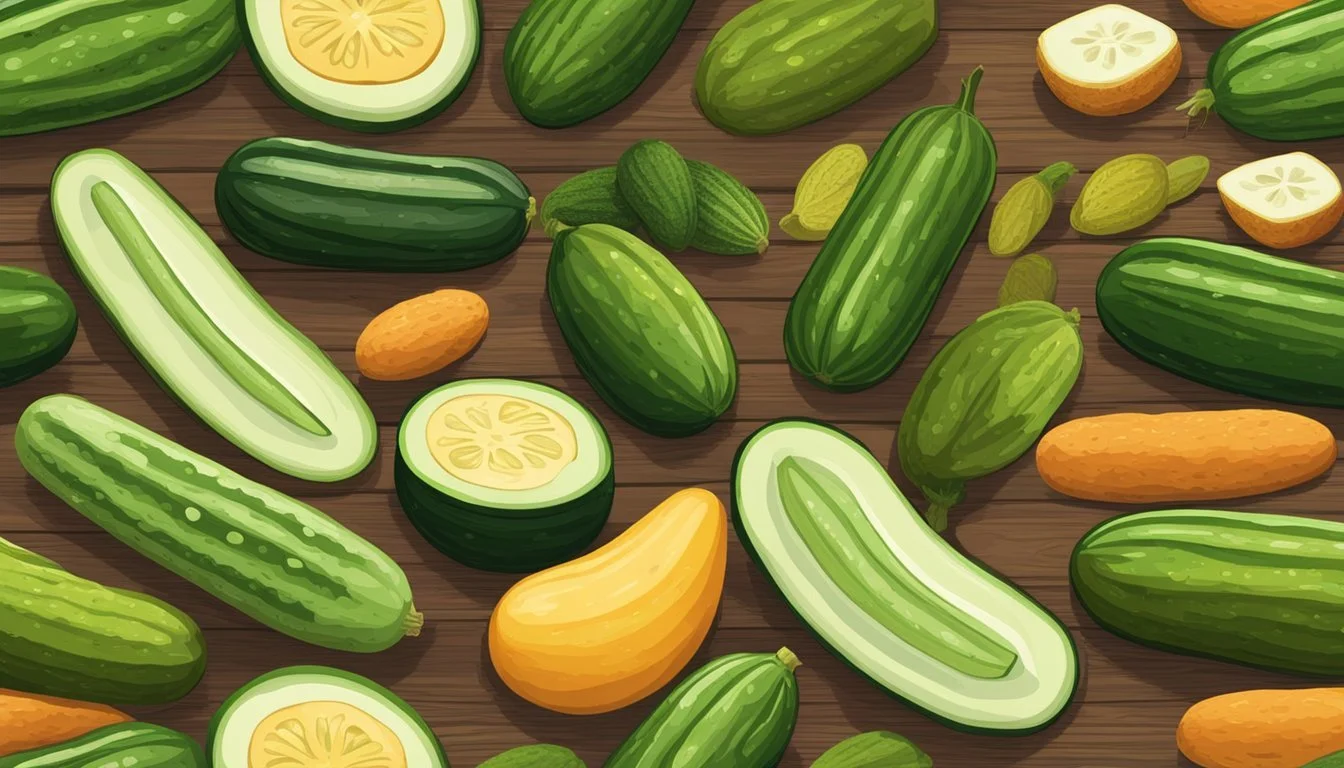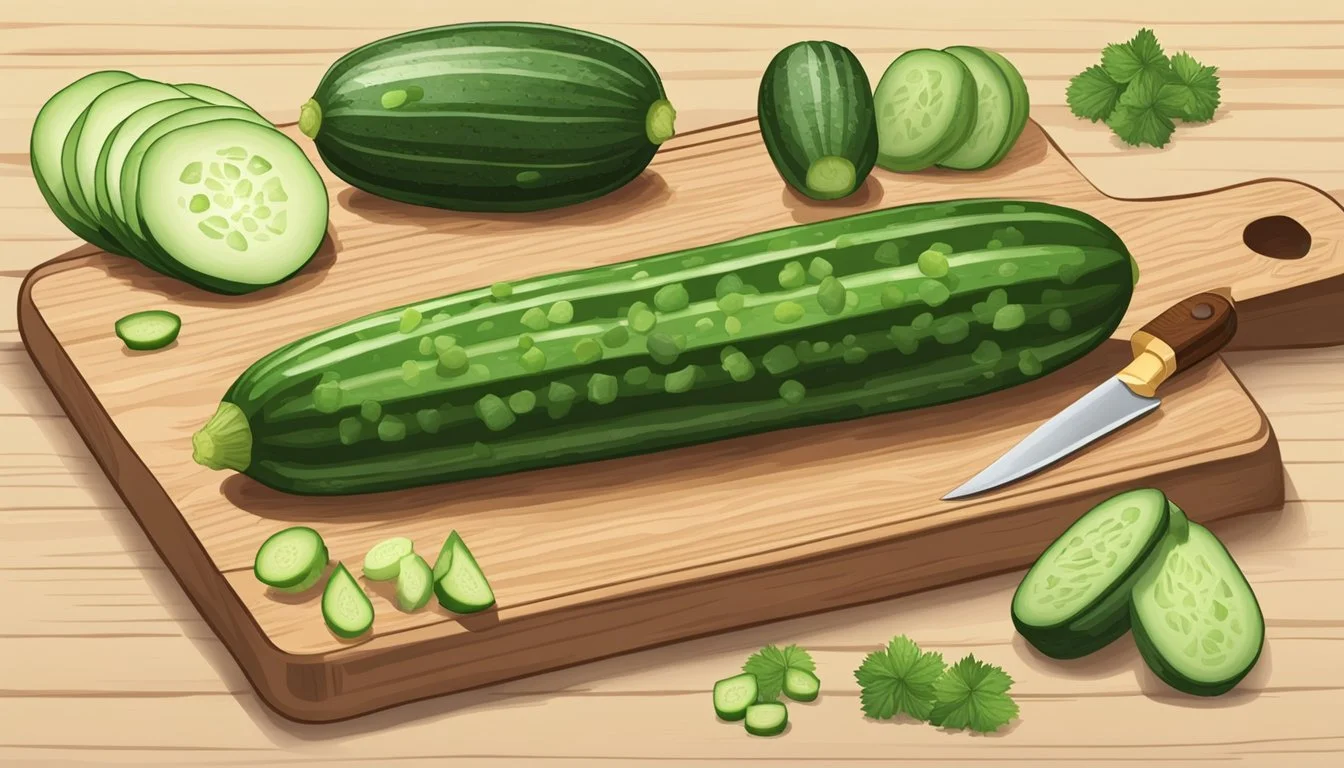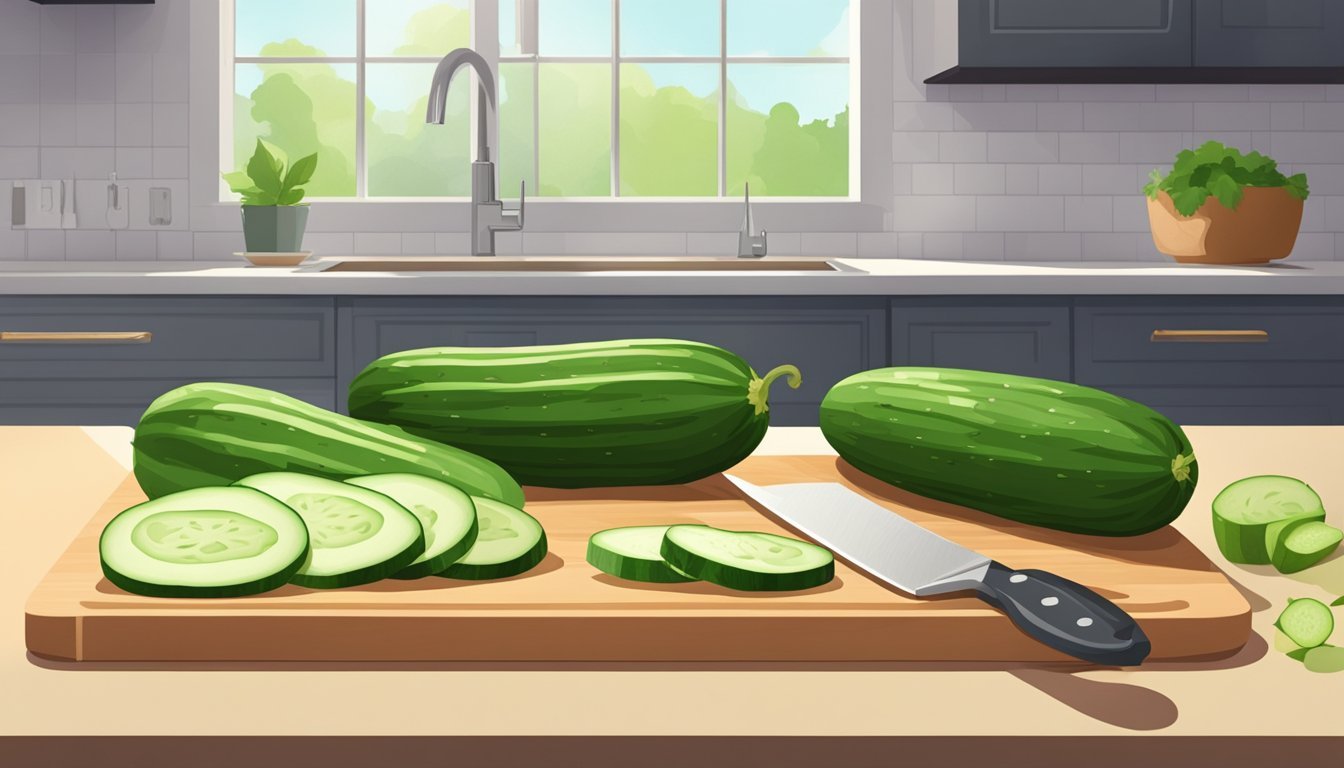Kirby Cucumber Substitutes
Best Alternatives for Recipes
Kirby cucumbers are a beloved ingredient in many kitchens, known for their small size, firm texture, and slightly bumpy skin. They are particularly popular for pickling and adding a crunchy element to salads. However, when Kirby cucumbers are unavailable, it's useful to know viable substitutes to keep your recipes fresh and satisfying.
English cucumbers and Persian cucumbers are excellent substitutes for Kirby cucumbers. These varieties share a similar crunch and mild flavor profile, making them ideal for salads and other fresh dishes. Additionally, Japanese cucumbers and zucchini can also serve as alternative options, offering a different take on textures and flavors.
For those looking for a more unconventional substitute, daikon radishes or celery can introduce a unique twist to your recipes. Each of these vegetables brings its distinct qualities but continues to provide the desired crunch and freshness that Kirby cucumbers contribute. This article explores these substitutes in detail to help you find the perfect match for your culinary needs.
Understanding Kirby Cucumbers
Kirby cucumbers are prized for their crisp texture and mild, sweet flavor. They are versatile in the kitchen, making them a staple for various culinary uses like pickling, salads, and sandwiches.
Characteristics of Kirby Cucumbers
Kirby cucumbers are small, often measuring between 2 to 4 inches in length. The skin is dark green and bumpy, which differentiates them from other smoother cucumber varieties. The thin skin means they don't need to be peeled for most recipes.
The flesh of Kirby cucumbers is firm and exceptionally crunchy. They have a mild, sweet taste, making them enjoyable to eat raw. These attributes make them ideal for pickling, as they retain their texture well during the process.
Additionally, because of their small size, Kirby cucumbers are perfect for adding to dishes without overwhelming other ingredients.
Culinary Uses
Kirby cucumbers are incredibly versatile. Due to their firm texture, they are a popular choice for pickling. The bumpy skin helps them absorb pickling brine effectively, ensuring a burst of flavor with each bite.
They are also excellent for fresh uses. In salads, their crispness adds a delightful crunch. They can be sliced thinly for use in sandwiches, contributing both texture and subtle flavor.
Their mild taste makes them suitable for a variety of dishes, from cold soups like gazpacho to quick snacks. Their small size means they are convenient to use whole or in large chunks without needing much preparation.
Common Cucumber Varieties
Cucumber varieties have distinct characteristics in terms of flavor, texture, and usage. This section explores three common types: English Cucumbers, Persian Cucumbers, and Japanese Cucumbers.
English Cucumbers
English cucumbers are long, thin-skinned, and often sold wrapped in plastic to preserve moisture. Known for their mild flavor and minimal seeds, they are a favorite for salads and sandwiches.
Key Characteristics:
Length: Typically about 12 inches.
Skin: Dark green and thin.
Flavor: Mild and less bitter than other varieties.
Seeds: Small and less prominent.
These cucumbers are often referred to as "hothouse" or "seedless" cucumbers and contain a high water content, making them refreshing and hydrating.
Persian Cucumbers
Persian cucumbers are shorter and slightly thicker than English cucumbers. They boast a crisp texture and sweet flavor, making them ideal for fresh consumption.
Key Characteristics:
Length: Around 5-7 inches.
Skin: Smooth, with a dark green hue.
Flavor: Sweeter than many other varieties.
Seeds: Small and delicate.
These cucumbers are often used in salads, snacks, and pickling due to their firm texture and palatable taste. They are also praised for their high water content and vibrant green color.
Japanese Cucumbers
Japanese cucumbers are slender with a bumpy skin and are known for their delicate, sweet flavor. Often used in Asian cuisine, they add a unique crunch to dishes.
Key Characteristics:
Length: About 8-9 inches.
Skin: Dark green with bumps.
Flavor: Sweet and subtle.
Seeds: Tiny and edible.
These cucumbers are versatile and can be used in salads, sushi, and pickled dishes. Their firm texture and distinct flavor make them a popular choice for various culinary applications.
Selecting Cucumber Substitutes
When selecting substitutes for Kirby cucumbers, it is important to consider factors such as flavor, texture, and the specific dish you are preparing. Each substitute brings its own unique qualities that may complement your recipe perfectly.
Criteria for Substitution
When choosing a substitute, texture and flavor are the primary criteria. Kirby cucumbers are known for their crunchy texture and refreshing taste. To match these qualities, look for substitutes that offer a similar crispness and mild flavor.
Size and shape are also important, especially for recipes where appearance matters. Small, uniform options like Persian cucumbers make excellent substitutes due to their similar profile.
Evaluating water content is critical to ensure the dish remains balanced. Substitutes such as zucchini and daikon radishes can provide the right moisture level.
Best Substitutes for Kirby Cucumbers
Here are some of the top substitutes:
Persian Cucumbers: These are small, crunchy, and have a mild flavor, making them a nearly perfect alternative. Use two Persian cucumbers to replace one standard cucumber.
English Cucumbers: With fewer seeds and thin skin, English cucumbers offer a crunch similar to Kirby cucumbers, suitable for salads and sandwiches.
Japanese Cucumbers: These cucumbers are crispy and slightly sweet, ideal for both raw dishes and pickling.
Zucchini: While not as crunchy, zucchini can be a good replacement in salads and stir-fries due to its similar moisture content.
Jicama: Known for its crisp texture and sweet taste, jicama can be used in salads and as a refreshing, raw snack.
Substitutes for Specific Dishes
For salads and sandwiches, Persian cucumbers and English cucumbers work best due to their crunch and flavor profile. Both maintain texture well in raw dishes.
In soups and stews, zucchini and celery are great options. Zucchini retains its form when cooked, and celery brings additional crunch and flavor complexity.
For pickling, Japanese cucumbers and daikon radishes excel. Japanese cucumbers maintain crispness and absorb flavors efficiently. Daikon radishes bring a unique taste and crunch.
Using the right substitute can make a significant difference in maintaining the integrity and taste of your dish.
Non-Cucumber Vegetable Substitutes
For those recipes where cucumbers are unavailable or don't fit your taste, various other vegetables can successfully substitute for them, offering distinct textures and flavors.
Zucchini and Summer Squash
Zucchini and summer squash are versatile and readily available stand-ins for Kirby cucumbers. Both vegetables possess a mild flavor and tender flesh that can absorb the flavors of seasonings and marinades.
When slicing zucchini for salads or sandwiches, its crunch mimics that of cucumbers. Summer squash can also be sliced into rounds or half-moons, perfect for fresh or cooked recipes. Due to their similar appearance when chopped into cubes, these vegetables are excellent for dishes where presentation matters.
Celery and Jicama
Celery and jicama offer a delightful crunch that can enhance many recipes. Celery brings a crisp, juicy texture with a slightly peppery flavor, making it a good substitute for raw applications like salads and dips.
Jicama, a root vegetable, is slightly sweet and very crunchy, perfect for slaw, stir-fries, or as a raw snack. When cut into thin strips or cubes, both celery and jicama add refreshing crispness to any dish. Combining these two vegetables can balance flavors and improve the overall texture of a meal.
Radishes and Carrots
Radishes and carrots are excellent options for those seeking a bit more flavor along with crunch. Radishes, whether sliced thin or chopped, provide a spicy kick and a satisfying crunch, suitable for salads and garnishes.
Carrots, known for their sweetness, can be julienned or shredded, adding both color and texture to your dishes. When preparing a vegetable platter, mixing radishes and carrots with other veggies enhances variety and presentation. Additionally, these substitutes work well in pickling recipes, offering robust flavors and crisp textures.
Alternative Ingredients for Cucumber Characteristics
When looking for alternatives to Kirby cucumbers, it's important to consider how various substitutes can replicate the cucumber's refreshing and mild flavor, juiciness, and crunchiness. These alternatives can be incorporated seamlessly into various recipes, each bringing unique attributes.
Fruit Substitutes
Bell Peppers
Bell peppers offer a crunchy texture similar to cucumbers and come in various colors, adding vibrancy to dishes. They're mildly sweet and can be used raw in salads or cooked in stir-fries. Their juiciness makes them a great option for cold dishes.
Apples
Apples provide a sweet and crisp texture that can replace cucumbers in salads. They add a different flavor profile, combining sweetness with a refreshing crunch. Green apples, in particular, can hold up well in both cold dishes and some cooked applications.
Herbs and Spices
Cucumber Essential Oil
Adding cucumber essential oil can help infuse dishes with the characteristic refreshing cucumber flavor, albeit in a more concentrated form. Use sparingly to avoid overpowering the dish.
Peppery Herbs
Herbs like arugula or watercress have a mild, peppery flavor that can stand in for the savory notes of cucumbers in salads and garnishes. They add a unique twist while preserving the fresh taste.
Additional Substitutes
Green Beans
Green beans are a nutrient-packed alternative that can be used both raw and cooked. They offer a similar crunch and mild flavor, making them versatile for various recipes, from salads to stir-fries.
Daikon Radish
Daikon radishes are mild-flavored and can be eaten raw or cooked. Their crisp texture closely mimics the crunch of cucumbers, making them a reliable substitute, especially in Asian-inspired dishes.
Jicama
Jicama has a refreshing bite and is very juicy, similar to cucumbers. It can be used in salads and salsas, offering a slightly sweet flavor that pairs well with other vegetables and fruits.
Each of these substitutes brings a slightly different characteristic to the table, whether it's sweetness, crunch, or a mild and savory flavor.
Selecting the Right Substitute for Your Recipe
Choosing the right substitute for Kirby cucumbers in your recipes can make a significant difference in the final dish. Each alternative offers unique benefits depending on the culinary needs.
Ingredients & Their Uses
Characteristics: Thin skin, mild flavor.
Best for: Salads, pickling.
Persian Cucumbers:
Characteristics: Small, firm, slightly sweet.
Best for: Slicing, fresh dishes.
Japanese Cucumbers:
Characteristics: Thin skin, few seeds.
Best for: Sushi, salads.
Characteristics: Similar appearance to cucumbers.
Best for: Grilling, stir-fries.
More Substitutes & Tips
Crunchy texture.
Best for: Adding crunch to salads.
Daikon Radish:
Mild spiciness.
Best for: Pickling, salads.
Bell Peppers:
Colorful, crunchy.
Best for: Salsas, snacking.
Practical Culinary Tips
For recipes requiring the crispness of cucumbers, jicama or celery provide a similar texture.
When seeking a mild flavor, Persian and English cucumbers are ideal.
For cooked dishes, zucchini and radishes offer excellent versatility.
Quick Reference Table
Substitute Characteristics Best For English Cucumber Thin skin, mild Salads, pickling Persian Cucumber Small, firm, sweet Slicing, fresh Japanese Cucumber Thin skin, few seeds Sushi, salads Zucchini Similar appearance Grilling, stir-fries Celery Crunchy texture Adding crunch Daikon Radish Mild spiciness Pickling, salads Bell Peppers Colorful, crunchy Salsas, snacking
Incorporating these substitutes can ensure your dishes maintain their intended textures and flavors.
Conclusion
Kirby cucumbers have a unique crispness and flavor, but several substitutes can work well in their place. English cucumbers are an excellent option due to their similar texture and taste.
Another suitable choice is the Persian cucumber. They're smaller and tender, making them ideal for salads and pickling.
Japanese cucumbers offer a slightly different taste profile but maintain the required crunch.
For those looking for a more unconventional substitute, zucchini can replace Kirby cucumbers in cooked dishes. It lacks the same snap but holds up well when heated.
Celery is another unexpected substitute. Its firm texture makes it a versatile option in cold dishes where crunch is needed.
Lastly, daikon radishes provide a crisp bite, albeit with a more peppery flavor. They work well in recipes requiring a stronger flavor note.
Kirby Cucumber Substitutes English Cucumber Persian Cucumber Japanese Cucumber Zucchini Celery Daikon Radishes
When selecting a substitute, consider the recipe's requirements. Different substitutes bring varied textures and flavors, influencing the dish's outcome. Online publications often recommend these alternatives, highlighting their versatility in numerous recipes.
In food writing, these alternatives are celebrated for their adaptability, ensuring that your culinary creations remain delicious and satisfying, even when Kirby cucumbers are not available.








